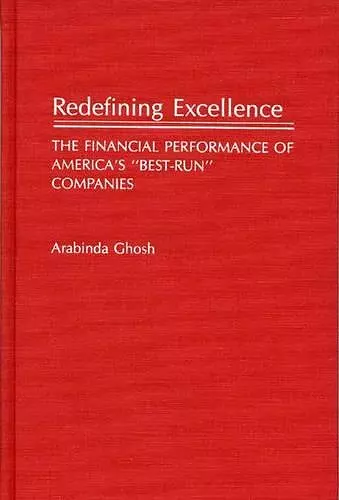Redefining Excellence
The Financial Performance of America's Best-Run Companies
Format:Hardback
Publisher:Bloomsbury Publishing PLC
Published:20th Nov '89
Currently unavailable, and unfortunately no date known when it will be back

Ghosh takes a hard, analytical look at the financial performance of those excellent firms often extolled as models for the future. Taking a list of these best-run companies and a control sample from the Fortune 500, he applies sophisticated statistical and econometric tools to analyze the performance of these firms, comparing that of the excellent firms with that of the control group.
A study of the financial performance of well-known firms over the past 25 years which compares the performance of these supposedly "excellent" firms with the financial performance and market valuation of a control sample from Fortune 500.
Management literature is full of examinations of so-called managerial excellence: firms such as GM, IBM, and DuPont have been managed in an exemplary fashion which others might emulate. Works such as Peters & Waterman's In Search of Excellence have extolled these firms as models for the future. In his new book, Ghosh responds to the hyberbole in this literature by taking a hard, analytical look at the real financial performance of such firms. His study of the financial performance of these well-known firms during the last twenty-five years (1960-1984), brings out significant findings that are invaluable to the investing public as well as to finance and management analysts.
Taking a list of these best-run companies and a control sample from the Fortune 500, the author applies sophisticated statistical and econometric tools to analyze their performance, comparing the excellent firms with the control group. By using these analytical techniques, Ghosh is able to determine whether these firms were indeed excellent from both the management's and stockholders' point of view. Over the period studied here, Ghosh discovers that the excellence of these firms has been transitory at best, that in most respects the control group has surpassed the excellent group in financial performance and market valuation in the long run, and that the excellent group has not exceeded the performance or the market generally. Given these results, Ghosh has called into question the whole 1980s notion of excellence (what it is and what it is not) and which firms are to be emulated for the long-term good of the U.S. economy. This book will have wide public appeal and be of special interest to scholars in management, finance, and economic history, as well as to financial and management analysts.
ISBN: 9780275933395
Dimensions: unknown
Weight: unknown
173 pages